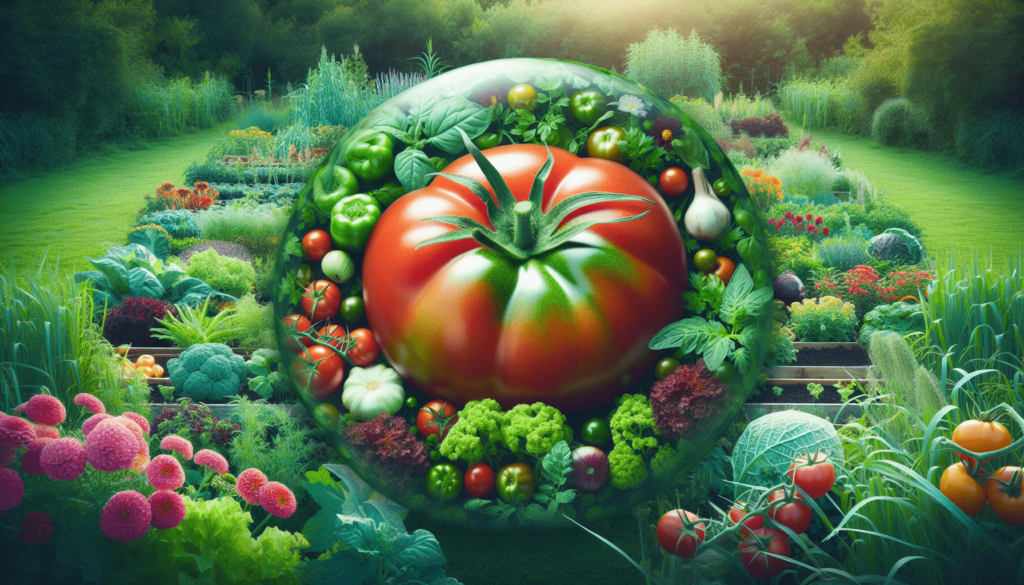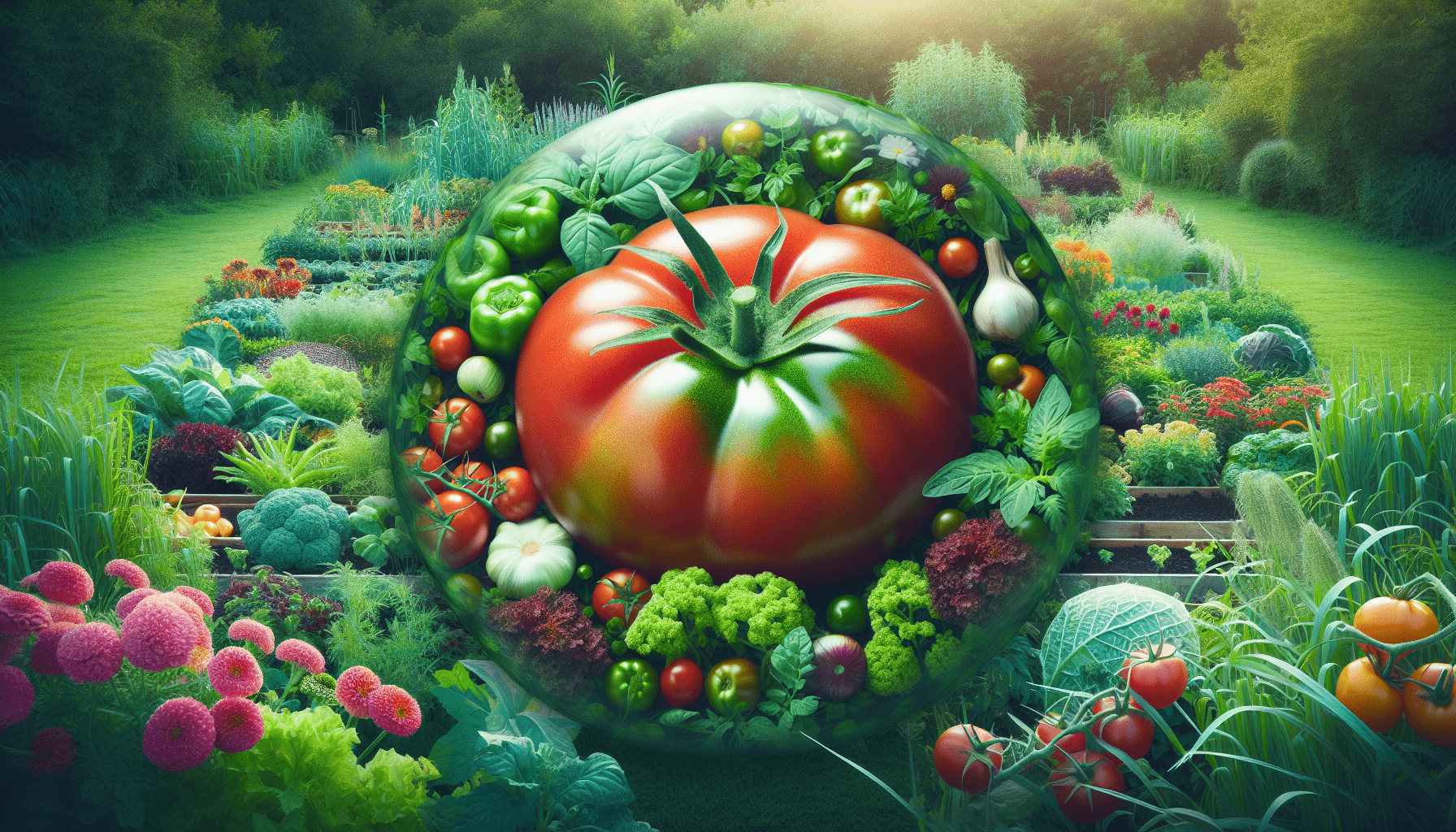Imagine transforming your backyard into a thriving oasis of fresh fruits, vibrant vegetables, and fragrant flowers, all grown organically. Not only will you enjoy the satisfaction of cultivating your own food, but you will also reap the numerous benefits that organic gardening provides. From better-tasting and healthier produce to promoting biodiversity and protecting the environment, organic gardening offers a multitude of advantages that can enhance your overall well-being. Whether you are a seasoned gardener or a novice, delving into the world of organic gardening will not only nourish your body, but also invigorate your soul.
1. Environmental Benefits
Reduced chemical usage
Organic gardening practices prioritize the use of natural alternatives to chemical pesticides and fertilizers. By avoiding synthetic chemicals, you contribute to a healthier ecosystem and protect the environment from harmful pollutants. This reduction in chemical usage also benefits your own well-being by minimizing your exposure to toxins.
Increased biodiversity
Organic gardening methods promote the growth of a diverse range of plants, attracting various beneficial insects and wildlife to your garden. This biodiversity helps maintain a balanced ecosystem, as these creatures play vital roles in pollination, pest control, and soil health. By nurturing a variety of plant species, you are providing a habitat for a wide range of organisms, ultimately creating a thriving and sustainable environment.
Improved soil health
Organic gardening focuses on building and nourishing the soil naturally. By using compost, organic matter, and natural fertilizers, you enhance the soil’s structure, fertility, and moisture-holding capacity. These practices promote the growth of beneficial microorganisms and earthworms that contribute to a healthy soil ecosystem. Improving soil health not only enhances plant growth but also aids in water conservation and reduces erosion.
2. Health Benefits
Nutritious produce
Organic gardening produces fruits, vegetables, and herbs that are rich in essential nutrients and free from synthetic additives. The absence of chemical pesticides and fertilizers allows the plants to grow naturally and develop higher concentrations of vitamins, minerals, and antioxidants, thus providing you with more nutritious food options.
Reduced exposure to toxins
By opting for organic gardening, you reduce your exposure to harmful chemicals commonly found in conventionally grown produce. The use of chemical pesticides has been linked to various health issues, including respiratory problems, neurological disorders, and certain types of cancers. By growing your own food organically, you have greater control over what you consume, promoting a healthier lifestyle for you and your loved ones.
Physical activity
Engaging in organic gardening involves various physical tasks such as digging, planting, weeding, and harvesting. These activities offer an excellent way to stay active and incorporate physical exercise into your daily routine. Gardening is not only a low-impact form of exercise but also a fulfilling way to spend time outdoors, connecting with nature and reaping the many health benefits it has to offer.

3. Cost Savings
Lower grocery bills
Growing your own organic produce can significantly reduce your grocery bills. By investing time and effort into cultivating your garden, you can have a steady supply of fresh fruits, vegetables, and herbs at little to no cost. The savings can be substantial, especially during peak seasons when such produce can be quite expensive in stores. Additionally, by storing and preserving your harvest, you can enjoy homegrown produce all year round, maximizing your savings.
Reduced healthcare costs
The consumption of organic, nutritious food can have a positive impact on your overall health and well-being, potentially leading to reduced healthcare costs. By incorporating fresh, pesticide-free produce into your diet, you may lower your risk of certain diseases such as obesity, heart disease, and diabetes. Investing in your health through organic gardening is not only a wise financial decision but also a valuable investment in your long-term well-being.
4. Food Security
Self-sufficiency
Organic gardening empowers you to take control of your food supply and become more self-sufficient. By growing your own produce, you are less dependant on external factors such as food shortages, price fluctuations, or transportation issues. This self-sufficiency allows you to have a constant and reliable source of fresh food, even during challenging times or emergencies.
Access to fresh produce
Having an organic garden grants you immediate access to fresh and flavorful produce right in your backyard. You can handpick your fruits and vegetables at their peak ripeness, ensuring maximum flavor and nutritional value. This direct access to freshly harvested produce eliminates the need for lengthy transportation and storage, further enhancing the taste and quality of your meals.
Emergency preparedness
An organic garden serves as a valuable asset during times of emergencies or natural disasters. In situations where food supplies may be disrupted or limited, having a well-maintained garden can provide you with a crucial lifeline. Your garden can supply you with nutritious food, helping you maintain your well-being and that of your loved ones during challenging circumstances.

5. Taste and Flavor
Enhanced freshness
One of the most rewarding aspects of organic gardening is the exceptional freshness and flavor that homegrown produce offers. The moment you harvest your fruits and vegetables, they are at the peak of freshness and retain their natural flavors. Nothing quite compares to the experience of biting into a sun-ripened tomato or savoring the aroma of freshly picked herbs. Organic gardening allows you to indulge in the full sensory experience of enjoying homegrown, flavorful produce.
Natural flavors
Organically grown fruits and vegetables tend to have a more intense and authentic taste compared to their conventionally grown counterparts. By avoiding the use of synthetic chemicals, organic gardening allows the natural flavors of the plants to shine through. The absence of chemical residues further enhances the purity and quality of the food, creating a palate-pleasing experience that elevates your meals to a whole new level.
6. Personal Satisfaction
Sense of accomplishment
Embarking on an organic gardening journey brings a tremendous sense of accomplishment and fulfillment. Witnessing the transformation of seeds into thriving plants and nurturing them through each stage is incredibly rewarding. The ability to grow your own food and contribute to a sustainable ecosystem instills a profound sense of achievement, connecting you with the cycle of life and nature’s wonders.
Connecting with nature
Organic gardening provides an opportunity to forge a deep connection with nature. As you spend time tending to your plants, you become more attuned to the rhythms of the seasons and the delicate balance of the natural world. Gardening cultivates a sense of mindfulness and appreciation for the beauty and resilience found in every plant and creature. It allows you to not only observe but actively participate in the intricate dance of life that surrounds you.
7. Educational Opportunities
Understanding ecosystems
Engaging in organic gardening opens the door to a wealth of educational opportunities. By observing the interactions between plants, insects, and the larger ecosystem, you gain a better understanding of the intricate web of life. Organic gardening encourages you to learn about companion planting, natural pest control methods, and the importance of soil health. This knowledge empowers you to make informed choices, not only in your own garden but also in supporting sustainable practices on a larger scale.
Teaching children about sustainability
Organic gardening provides an invaluable educational platform for children to learn about sustainability, ecology, and healthy eating. Involving kids in the gardening process allows them to witness firsthand the wonders of nature and develop a deeper appreciation for the environment. As they plant seeds, tend to plants, and harvest the fruits of their labor, children learn about responsibility, patience, and the importance of stewardship. Organic gardening instills lifelong values and fosters a connection with the natural world in the youngest members of our society.
8. Community Engagement
Sharing surplus produce
Organic gardening often results in abundant harvests, providing an opportunity to connect and engage with your community. Sharing your surplus produce with neighbors, friends, or local food banks not only fosters a sense of generosity and goodwill but also promotes a more sustainable food system. By reducing food waste and distributing fresh, organic produce locally, you contribute to a healthier community and create stronger social bonds.
Building relationships
Engaging in organic gardening can lead to meaningful connections with like-minded individuals. Community gardens, gardening clubs, and farmers’ markets offer platforms to meet fellow gardeners, exchange knowledge, and share experiences. By participating in these communal spaces, you contribute to the fabric of your community, forging relationships, and building a supportive network that shares a passion for sustainable living.
9. Aesthetic Appeal
Beautiful gardens
Organic gardens are not only a source of nourishment but also a feast for the eyes. The vibrant colors, textures, and fragrances of blooming flowers, lush foliage, and thriving crops create a visually stunning landscape. Organic gardening allows you to design and cultivate a garden that reflects your personal taste and style, transforming your outdoor space into a sanctuary of natural beauty.
Enhancing property value
An organic garden can have a positive impact on the value of your property. A well-maintained garden adds aesthetic charm and creates a unique selling point for potential buyers. The allure of having a sustainable, organic garden appeals to environmentally conscious individuals and those seeking a connection with nature. Investing in your garden not only enriches your daily life but also enhances the long-term value and appeal of your property.
10. Climate Change Mitigation
Reduced carbon footprint
Organic gardening practices contribute to the mitigation of climate change by reducing greenhouse gas emissions. The use of organic fertilizers and soil-building techniques helps capture and sequester carbon from the atmosphere, effectively reducing the concentration of carbon dioxide, a major greenhouse gas. Additionally, organic gardening avoids the fossil fuel-intensive processes involved in the production and transportation of synthetic chemicals, further reducing your carbon footprint.
Sustainable land use practices
Engaging in organic gardening encourages sustainable land use practices. By prioritizing soil health, organic gardening minimizes the need for synthetic fertilizers and chemical inputs, reducing the impact on local water systems and ecosystems. Organic gardening also emphasizes crop rotation and diversity, which aids in preventing soil erosion and maintaining long-term soil fertility. These practices promote sustainable land management, conserving natural resources and fostering a harmonious relationship between agriculture and the environment.
In conclusion, the benefits of organic gardening extend far beyond simply growing your own food. By adopting organic gardening practices, you can make a positive impact on the environment, improve your health and well-being, and contribute to a more sustainable future. From the abundance of fresh, nutritious produce to the sense of personal satisfaction and connection with nature, organic gardening brings numerous rewards that enhance every aspect of your life. So, grab your gardening tools, embrace the power of nature, and embark on an organic gardening journey that will nourish your body, mind, and soul while nurturing the planet we call home.

